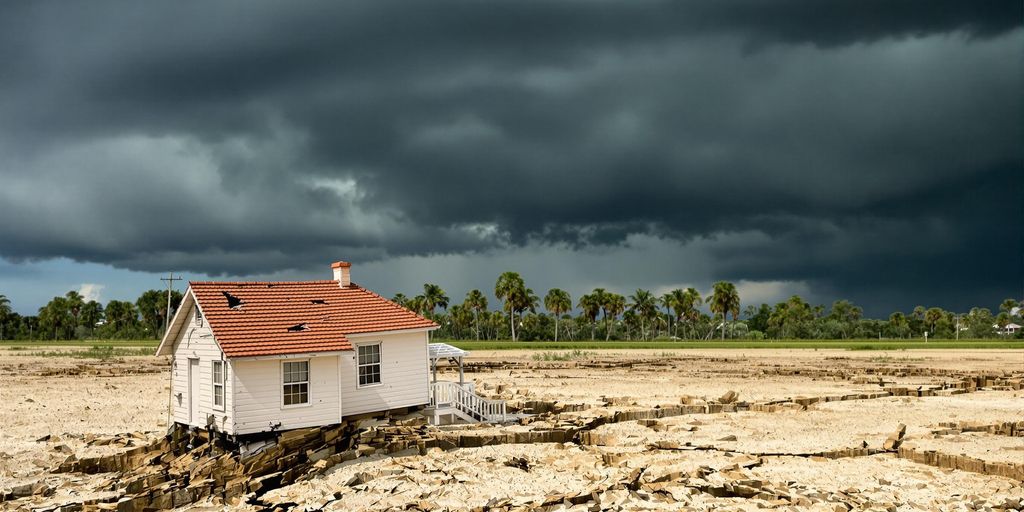Florida’s housing market is facing significant instability, with several key areas at high risk of price declines and a potential crash. Factors such as soaring insurance costs, rising HOA fees, increased inventory, and a slowdown in migration are contributing to this downturn, prompting concerns among residents and experts alike.
Florida’s Housing Market: A Shifting Landscape
Once a magnet for retirees and those seeking a lower cost of living, Florida’s housing market is now experiencing a dramatic shift. Home prices, which surged by an average of 70% to 90% since the pandemic, are now showing signs of significant correction. This rapid appreciation, coupled with escalating costs, has made homeownership increasingly unaffordable for many.
Key Factors Driving the Downturn
Several critical factors are contributing to the instability in Florida’s housing market:
- Skyrocketing Insurance Costs: Following the 2021 Surfside condominium collapse, new legislation mandated annual safety inspections for condos 30 years and older, leading to increased premiums. Some residents face "unsustainable levels" of insurance costs, making it difficult to obtain financing.
- Soaring HOA Fees: Homeowner association fees have seen substantial increases, with some areas in South Florida experiencing a 60% jump since 2019. These fees are rising to cover necessary repairs and maintenance, further burdening homeowners.
- Increased Inventory and Slowing Demand: The market is seeing a significant increase in active listings, with sellers outnumbering buyers. This imbalance is giving buyers more negotiating power and forcing sellers to lower asking prices. The frantic pace of migration to Florida has also slowed, reducing demand.
- Affordability Crisis: Despite recent dips, home prices remain drastically higher than pre-pandemic levels. Combined with high interest rates, many potential buyers are priced out. Florida’s median sales price dipped to $390,000 in April 2025, falling below the national median.
Markets at High Risk of Price Decline
According to Cotality data from April 2025, five Florida housing markets are at a "very high risk" of experiencing a major price decline. These areas saw explosive growth, making them particularly vulnerable to corrections:
| Rank | Market Name |
|---|---|
| 1 | Cape Coral, FL |
| 2 | Lakeland, FL |
| 3 | North Port, FL |
| 4 | St. Petersburg, FL |
| 5 | West Palm Beach, FL |
Additionally, Winter Haven and Tampa have also been flagged for a high risk of price decline, with Fort Myers, Punta Gorda, and Sarasota experiencing notable drops.
Impact on Residents and the Market
The escalating costs are forcing some residents to consider leaving Florida, with reports indicating an uptick in Floridians moving to states like New York. Experts warn of a potential "domino effect" if condo associations face bankruptcy due to repair costs, leading to foreclosures and plummeting property values.
For buyers, this shifting market could present opportunities, but caution is advised. Sellers, particularly in high-risk areas, must price their homes competitively based on current market conditions. Homeowners not planning to sell may experience a "paper loss" in their home’s value, but should focus on managing rising ownership costs.
Looking Ahead
The future of Florida’s housing market will depend on various factors, including continued migration, stabilization of insurance costs, and interest rate trends. While a sudden crash like 2008 is not universally predicted, a significant price correction is likely and may be a necessary adjustment for the market to align with long-term affordability.
Sources
- Massive Florida Real Estate Crisis Driving Thousands to New York, WIBX 950.
- This popular program is expected to relaunch next week, WPTV.
- 5 Popular Florida Housing Markets Are at High Risk of Price Crash, Norada Real Estate Investments.
- 2 Florida Housing Markets Flagged for a Major Price Decline Risk, Norada Real Estate Investments.
- US House Prices Report Slow Growth, With Florida at Helm, Newsweek.


